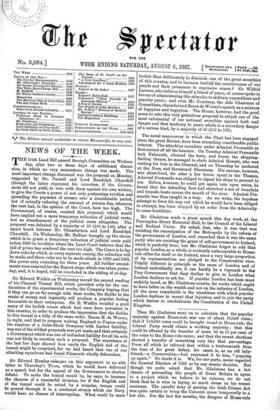Then Mr. Gladstone went on to calculate that the popular
majority against Home-role was one of about 76,000 votes; that if 150,000 votes could be brought round to Home-rule, the Liberal Party would obtain a working majority ; that this could be effected by the transfer of some 10 to 11 per cent. of the votes to the Home-rule cause ; and that the recent elections showed a transfer of something very like that per-oentage. From alt which he inferred that within a twelvemonth from the time of his great defeat, his cause ia, as an old lady- friend,—a Conservative,—had expressed it to him, " popping up again." No doubt it is. We, for our parts, never regarded the General Election of 1886 as by any means decisive. But though we quite admit that Mr. Gladstone has a fair chance of persuading the people of Great Britain to agree to a project which we believe to be ruinous, we do not think that he is wise in laying so much stress on his recent successes. The painful duty of passing the Irish Crimes Act was quite certain to bring the Unionist cause temporarily to a low ebb. For the last few mouths, the dangers of Hommtdo
have been forgotten in that invidious but most necessary work. And now, if the Crimes Act is administered wisely and firmly, the Unionists, may, we believe, soon regain the credit they have • temporarily lost, and be able to bring back the popular mind to the frightful dangers of substituting a clumsy and gratuitous federal system for the old British Constitution. On the re- mainder of Mr. Gladstone's telling speech, delivered with the vivacity of a young man, and also with a complete unconscious- nests of embarrassment in relation to the very different political views which he formerly held, we have dwelt sufficiently in another column.



































 Previous page
Previous page